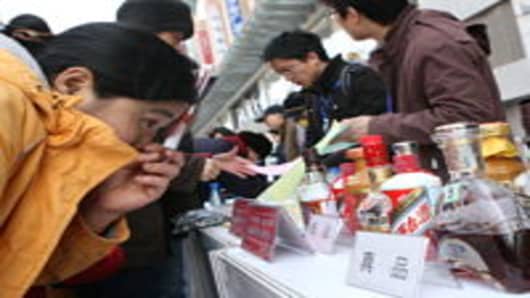Spirits are running high before this week’s Chinese New Year holiday as prices of a popular grain liquor soar.
Moutai, the fiery official liquor for state banquets since the Communist revolution, has been variously described by foreign dignitaries as “liquid razor blades” and “smelling like a barnyard and tasting like turpentine”. It was famously inflicted on Richard Nixon during his historic visit to China in 1972 and on Margaret Thatcher in 1984, after she agreed to return Hong Kong to China.
But for those seeking the perfect gift to curry favor with Chinese officials, moutai is indispensable at this time of year. With annual food inflation hitting 7.2 per cent last year and with stocks running dry, the state-controlled company that makes China’s most famous moutai brand raised wholesale prices 20 per cent this month – its first increase in a year.
For a standard half-liter bottle of Feitian Moutai, which has an alcohol content of 53 per cent, China Kweichow Moutai Distillery is now recommending a maximum retail price of 959 yuan ($146). Retail prices have, however, leapt from less than 700 yuan at the start of 2010 to more than 1,300 yuan before the Year of the Rabbit.
Empty bottles of vintage Moutai, which are very difficult to fake, can now fetch well over 5,000 yuan on the black market. Counterfeiters refill the old bottles with new, inferior moutai for resale at exorbitant prices. Kweichou Moutai reserves 40 per cent of its annual output for direct sale to Communist party and government departments at set prices, insulating officials from the worst of the price rises.
In announcing the 20 per cent increase, Kweichou Moutai said that it was seeking to “balance and protect the interests of the state, consumers, the company, retailers and investors”.
“Prices of high-end liquor are rising so fast because there’s so much money sloshing around in the Chinese economy, not because of higher food prices,” said Sam Mulligan at DDMA, a market research firm.
Kweichow Moutai, whose shares have soared since it listed in Shanghai in 2001, has a market capitalization bigger than that of Air China and metals group Baosteel.


